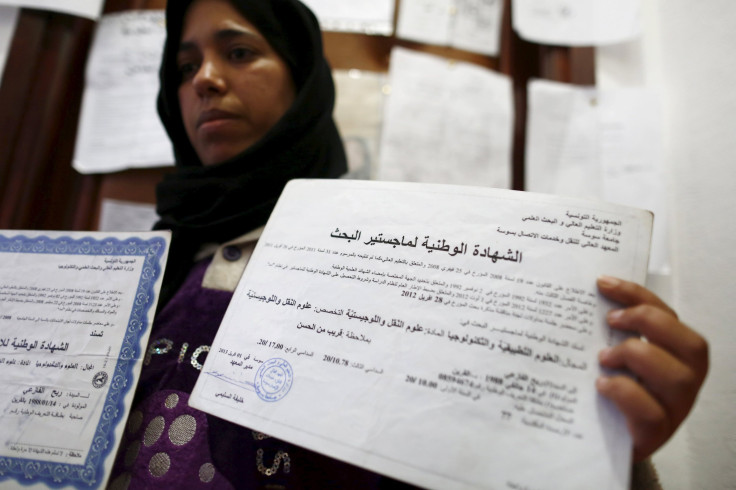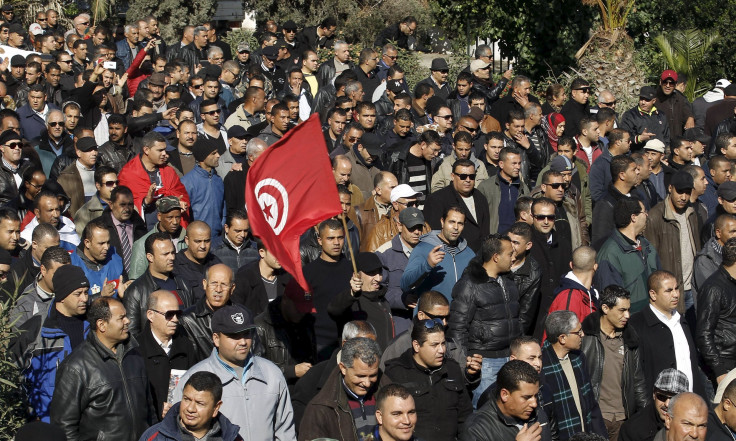ISIS, Extremists Recruit The Young Unemployed And Underpaid In Tunisia

BEIRUT— Mohamed is on a job hunt — something he’s grown accustomed to. Anything will do, the 23-year-old Tunisian tells International Business Times. He’s been out of work for five years, since the time in January 2011 he took to the streets in the wave of popular protests that became known as the Arab Spring. But while other uprisings disintegrated into bloody chaos and intractable civil war, Tunisia’s “Jasmine Revolution” is widely regarded as the solitary success story in the Arab world. Still, it’s not all sunshine and flowers — around 200,000 Tunisians between the ages of 18 and 34 are unemployed, desperate for work and a livable wage. What’s more, the multitude of idling youth is proving to be fertile recruiting ground for terrorist organizations like the Islamic State group, also known as ISIS.
Tens of thousands of young Tunisians held nationwide protests last week, demanding that the government take concrete action against the high unemployment rate and low wages. More than 1,100 people were arrested during the protests, after which the Ministry of the Interior enforced an indefinite national curfew.
Mohamed, who asked that his last name not be published for security reasons, was among those protesting in his hometown, the coastal city of Sousse. For him, and for thousands of others, the curfew cannot be justified. All he wants, he says, is “a good job that will allow me to live.”

Wael Ouni, 19, sympathizes with the protesters. “It’s been five years and the revolution hasn’t changed anything — it’s the opposite, it has made things worse,” he said. “Now young people are ISIS’ targets to be recruited and to be given money.”
Tunisia has the highest number, per capita, of foreign fighters joining ISIS in Iraq and Syria. The group has also made significant gains in Libya, across the border from Tunisia, providing a closer training base for potential Tunisian recruits. For now, “the concern is that [the Tunisian foreign fighters in Iraq, Syria and Libya] are going to come back,” Peter Pham, director of the Atlantic Council’s Africa Center, told IBT.
Tunisia is an attractive jihadi recruitment ground for three reasons. The country’s prisons are at 138.9 percent of capacity, and those incarcerated for terrorism are placed in close quarters with other prisoners, where radicalization is common.
Second, although Tunisia is a Muslim-majority country, secularism is strictly enforced under the new democratically elected government, as it was for decades before under former President Zine El Abidine Ben Ali. This strict secularism policy has left many religious Tunisians with no alternative but to join extremist groups like ISIS, since they are the only groups that represent a faith-based ideology.
In an interview with the Council on Foreign Relations Tunisian Prime Minister Habib Essid said, “Some of [the extremists] they think that through jihad they can go to paradise and things like that.” But, according to the prime minister, the most common and significant factor drawing Tunisians to ISIS are “economic reasons. They didn’t have jobs ... They couldn’t have a normal life.”
While a certain level of economic instability is expected in the wake of a major uprising and regime change, Tunisia’s unemployment numbers have started to rise again this year. At the end of 2014, 15 percent of the population was unemployed. A year later, that figure sits at 15.3 percent, an increase of 50 percent from before the revolution. This year alone, unemployment among men with a university degree rose from 20.8 percent to 21.4 percent, according to Tunisia’s National Institute for Statistics. Today, roughly 240,000 university graduates in Tunisia are unemployed.
“All of the interior regions are now asking themselves if they made a lot of sacrifices to bring about revolution only to have less buying power, more unemployment, more insecurity and more terrorism,” said Tawfik Jelassi, who served as the minister of Higher Education, Scientific Research and Information & Communication Technologies in Tunisia until February last year. “What are the benefits of this revolution for them? They see their day-to-day lives as having gotten worse rather than better.”
Ouni’s cousin is among those led by financial desperation to join an extremist group. His cousin quit school at the age of 14 so that he could work and support his family, IBT previously reported. He found a low-paying job at a hotel gift shop, but quickly packed a bag to join ISIS in Syria when the militants told him they would transfer $1,500 by Western Union to his family back in Tunisia.
Even those who do have jobs, mostly have low incomes, making extremists groups like ISIS much more appealing since they pay in U.S. dollars.
“The problem isn’t just the work. There is some work but it is poorly paid and there are some with diplomas who have been five years without a job. The worst is the young people who go work with Daesh for $1,500 a month,” Ouni said, using the Arabic acronym for ISIS. “How can you explain that the Tunisians in Daesh are paid in U.S. dollars? We don’t have this currency!”
ISIS and other terrorist groups in the region are aware of the recruitment opportunities that Tunisia’s high youth unemployment offers them and have played their part in making sure the economy remains in a dire situation. Last year, Tunisia’s tourism industry — accounting for around a sixth of the country’s gross domestic product — was the target of two deadly terror attacks, both claimed by ISIS.
The terror attacks were designed to undermine the legitimacy of the government, Atlantic Council’s Pham told IBT. “Targets were chosen by extremists for propaganda purposes but also because hitting museums and hotels is a good way to get cancellations,” he said.
Ouni is a financial victim of these attacks. He used to have a summer job in Sousse’s Hotel Riu Imperial Marhaba but he was laid off at the start of last summer, a day after 24-year-old Seifeddine Rezgui walked onto the hotel’s beach and opened fire on tourists.
Ouni has since found another job, but hundreds of thousands of young men and women in Tunisia haven’t been so lucky as they run out of viable options.
“It seems that [since the attacks] recruitment has increased. [An] economic [downturn] and fewer job prospects have made it easier to recruit,” Pham added.
As unemployment continues to rise, so does the likelihood that desperate young men will join ISIS — not so much out of ideology as a desire for hard currency.
© Copyright IBTimes 2025. All rights reserved.






















